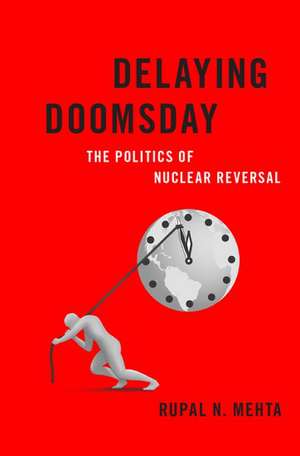Delaying Doomsday: The Politics of Nuclear Reversal: Bridging the Gap
Autor Rupal N. Mehtaen Limba Engleză Hardback – 20 feb 2020
Preț: 249.69 lei
Nou
Puncte Express: 375
Preț estimativ în valută:
47.78€ • 49.37$ • 39.75£
47.78€ • 49.37$ • 39.75£
Carte disponibilă
Livrare economică 15-21 februarie
Preluare comenzi: 021 569.72.76
Specificații
ISBN-13: 9780190077976
ISBN-10: 0190077972
Pagini: 264
Dimensiuni: 160 x 236 x 28 mm
Greutate: 0.57 kg
Editura: Oxford University Press
Colecția OUP USA
Seria Bridging the Gap
Locul publicării:New York, United States
ISBN-10: 0190077972
Pagini: 264
Dimensiuni: 160 x 236 x 28 mm
Greutate: 0.57 kg
Editura: Oxford University Press
Colecția OUP USA
Seria Bridging the Gap
Locul publicării:New York, United States
Recenzii
Delaying Doomsday sheds new light on an important and policy-relevant question: when and why do states end their pursuit of nuclear weapons? The book highlights the importance of US policy for effectively countering nuclear proliferation around the world.
Why do countries renounce their nuclear ambitions? Rupal Mehta answers this important question with a novel theory and evidence, pointing to the crucial role of external actors such as the United States in shaping incentives for states to undergo nuclear reversal. Accessible, timely, and compelling, the book has enormous implications for ongoing proliferation challenges such as Iran and North Korea and the conduct of US foreign policy."-
Why do countries renounce their nuclear ambitions? Rupal Mehta answers this important question with a novel theory and evidence, pointing to the crucial role of external actors such as the United States in shaping incentives for states to undergo nuclear reversal. Accessible, timely, and compelling, the book has enormous implications for ongoing proliferation challenges such as Iran and North Korea and the conduct of US foreign policy."-
Notă biografică
Rupal N. Mehta is an Assistant Professor in the Department of Political Science at the University of Nebraska-Lincoln. Previously, she was a Stanton Nuclear Security Postdoctoral Fellow in the Belfer Center at Harvard University's Kennedy School of Government. She holds a Ph.D. in Political Science from the University of California, San Diego. Her research interests lie in international security, with a specialization in nuclear proliferation, extended deterrence, and nuclear latency. Her work has appeared in Journal of Conflict Resolution, International Studies Quarterly, Journal of Strategic Studies, The Washington Quarterly, and the Washington Post's Monkey Cage.










